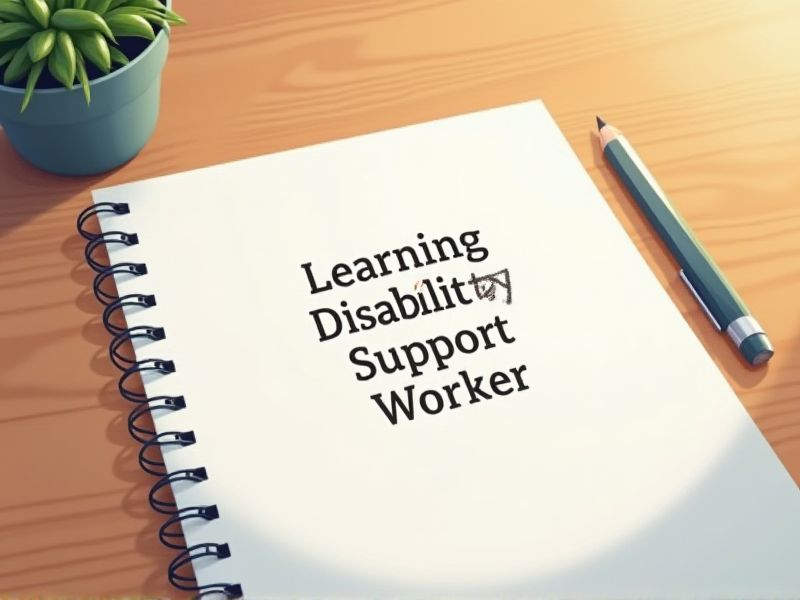
Learning Disability Support Workers play a crucial role in assisting individuals with learning challenges, ensuring tailored support and effective communication. Certain certifications provide workers with essential knowledge about safe handling techniques and individualized care approaches. These certifications also enhance understanding of legal requirements and ethical standards. Key certifications you may need for a Learning Disability Support Worker include the following.
Certificate III in Individual Support (Disability)
Having a Certificate III in Individual Support (Disability) equips individuals with the essential skills and knowledge to meet the diverse needs of people with learning disabilities. This certification ensures that support workers can provide personalized care, thereby improving the quality of life for those they assist. Employers often require this qualification to ensure consistent and standardized service delivery across the disability sector. The training also covers legal and ethical frameworks, reducing the risk of non-compliance in the professional practice.
Certificate IV in Disability
Employers often require a Certificate IV in Disability to ensure that learning disability support workers possess the necessary skills and knowledge to provide effective support. This qualification equips workers with an understanding of individual support needs, enhancing their ability to deliver personalized care. Legal and industry standards frequently mandate such certifications to maintain a consistent level of care across services. Completing this certificate fosters professional development, increasing job opportunities and career advancement in the field.
Certificate in Learning Disabilities
A Certificate in Learning Disabilities equips support workers with specialized knowledge about various learning disorders, enhancing their ability to design effective interventions. It improves the worker's understanding of individualized education plans, which is crucial for tailoring support to each person's unique needs. Having this certification signifies a commitment to professional development, increasing trust from families and educational institutions. The credential often leads to better outcomes for those with learning disabilities, as well-trained staff can implement evidence-based strategies more effectively.
Mental Health First Aid Certification
The Mental Health First Aid Certification equips learning disability support workers with the necessary skills to identify and respond appropriately to mental health challenges in individuals they support. Having this certification can improve the support workers' ability to de-escalate potentially stressful situations, contributing to a more stable environment for both the worker and the person with a learning disability. This training increases awareness of mental health conditions, which can lead to more personalized and effective care strategies. It also helps break down the stigma surrounding mental health, fostering a more inclusive and accepting community for people with learning disabilities.
First Aid and CPR Certification
First Aid and CPR certification equips Learning Disability Support Workers with essential skills to manage emergencies, reducing risk of harm to individuals with learning disabilities. Individuals with learning disabilities might have specific medical needs or vulnerabilities that require prompt and knowledgeable intervention. Certification ensures that support workers can provide immediate care, facilitating a safer environment and potentially saving lives. Properly trained staff enhances trust and reassurance for families and caregivers, knowing that their loved ones are in capable hands.
Working with Vulnerable People Certification
The Working with Vulnerable People Certification ensures that learning disability support workers understand the intricacies of safeguarding and protection. Obtaining this certification equips support workers with the skills to identify and respond to potential risks effectively. It provides a framework for ethical practices, promoting trust and safety in care environments. Certification reinforces professional credibility, assuring families and guardians that the support worker is properly trained in handling sensitive situations.
Nonviolent Crisis Intervention Certification
Nonviolent Crisis Intervention Certification equips Learning Disability Support Workers with effective techniques to de-escalate potentially stressful or aggressive situations, enhancing safety for both staff and individuals. This training instills confidence in handling crises, which reduces the likelihood of injury and supports a more secure learning environment. Certified workers can apply proactive strategies that prevent escalation, contributing to a calmer and more productive atmosphere for people with learning disabilities. Regulatory bodies and educational institutions often mandate such certifications, ensuring compliance with safety standards and enhancing professional credibility.
Positive Behaviour Support Training Certification
Positive Behaviour Support (PBS) Training Certification equips Learning Disability Support Workers with strategies to reduce challenging behaviors, enhancing the quality of life for individuals. By applying evidence-based practices, these workers can foster safer and more supportive environments, which are crucial for effective learning. The certification ensures that support workers understand the underlying causes of behaviors, allowing for tailored interventions. Without PBS training, support workers may struggle to implement consistent and structured approaches, risking ineffective support.
Safeguarding Adults and Children Certification
Having Safeguarding Adults and Children Certification equips Learning Disability Support Workers with essential skills to identify and respond to signs of abuse or neglect. Certification ensures they adhere to legal and ethical guidelines, fostering a safe and supportive care environment. Training in safeguarding promotes awareness and prevents potential harm, enhancing overall well-being for vulnerable individuals. Employers often require certification to comply with regulatory standards and demonstrate commitment to client safety.
Assistive Technology in Disability Support Certification
Assistive Technology in Disability Support Certification equips Learning Disability Support Workers with the skills to integrate innovative tools, enhancing learning outcomes for individuals with disabilities. This certification ensures workers are knowledgeable about the latest adaptive technologies, enabling them to tailor educational approaches effectively. With this expertise, support workers can bridge gaps in traditional teaching methods, fostering greater independence for individuals. The certification instills confidence in both workers and individuals, establishing a more inclusive educational environment.
Summary
When you obtain certifications as a Learning Disability Support Worker, you enhance your professional credibility and skill set. Certification may lead to increased job opportunities and potentially higher wages. Your ability to provide specialized support improves, resulting in better outcomes for individuals with learning disabilities. Employers may prefer certified workers, which can make you a more attractive candidate for positions and promotions.
